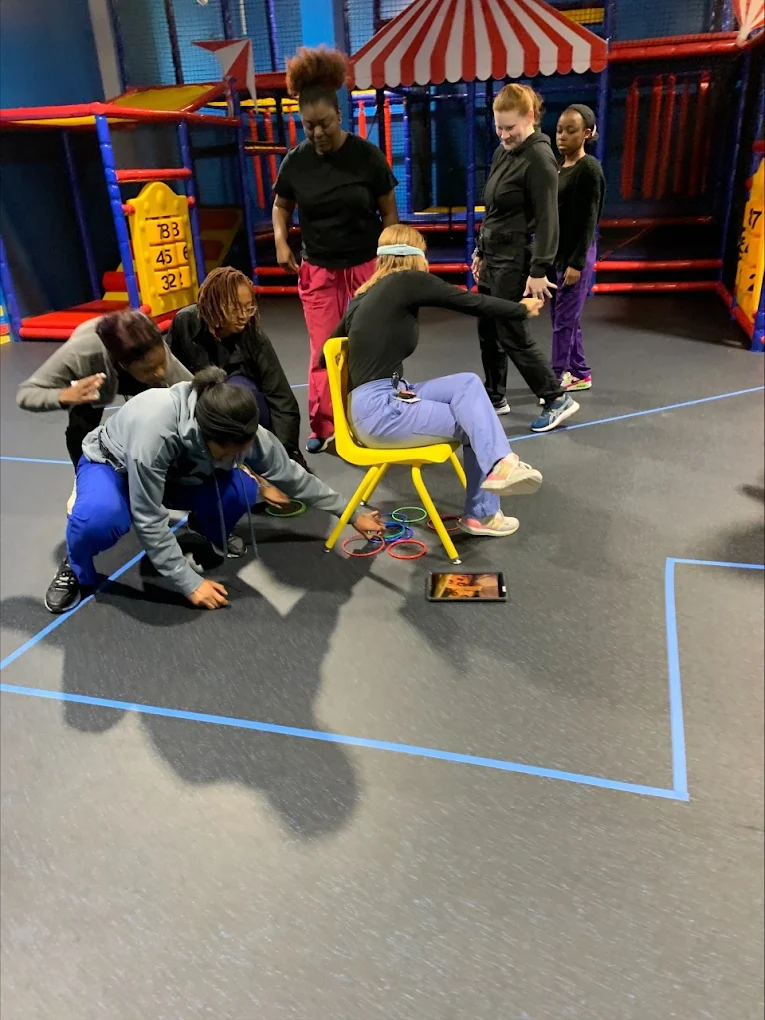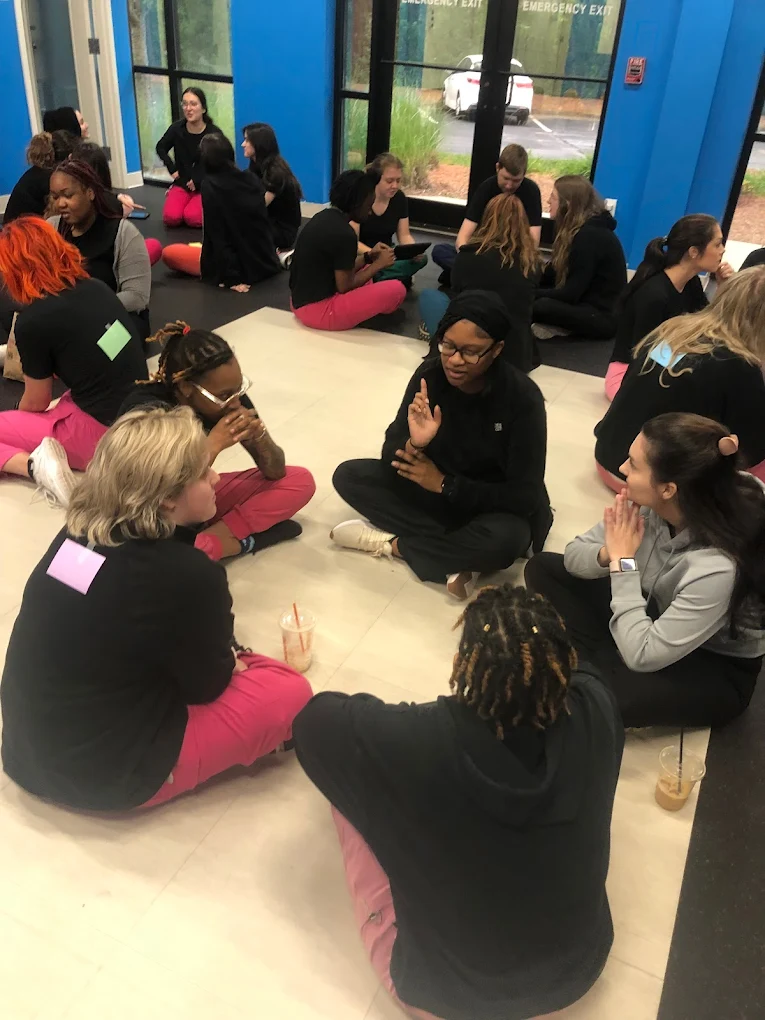
ABA Therapy for Teens in Alpharetta: What Sets It Apart from Early Childhood Programs
ABA therapy for teens in Alpharetta is carefully tailored to meet the unique developmental needs of adolescents, going beyond the foundational skills addressed in early childhood programs. While early childhood ABA focuses on communication, basic social skills, and self-help behaviors, teen programs emphasize independence, complex social interactions, emotional regulation, and real-world problem-solving.
At Therapyland, we understand that teenagers face new challenges as they grow, from navigating friendships to developing daily living skills, and our ABA therapy adapts to support these transitions. In this article, we explore how therapy goals, strategies, and environments are designed specifically for teens with autism spectrum disorder and developmental disabilities, helping them build confidence, master life skills, and thrive both at home and in their communities.
Ready to help your teen develop independence, social skills, and confidence? Contact Therapyland in Alpharetta today at 678-648-7644 to schedule an assessment and learn how our tailored ABA programs can support your teen’s growth and success.
👉Also Read: Navigating Preteen Changes: How ABA Therapy Supports Growing Needs
Key Differences Between ABA Therapy for Adolescents and Early Childhood Programs
Goals and Objectives
The goals and objectives of ABA therapy shift significantly from early childhood to adolescence. Children’s ABA therapy center primarily focuses on building foundational skills, such as basic communication, early social interactions, and self-help behaviors. As children grow into teenagers, therapy goals evolve to emphasize social competence, independence, and the application of skills in real-life contexts.
For teens, the focus expands to include emotional regulation, complex social problem-solving, community participation, and preparation for future responsibilities. Community-based activities, recreational experiences, and practical life skills exercises become integral components of therapy, helping teens apply what they learn in everyday settings. In Alpharetta, Therapyland therapists design individualized treatment plans tailored to each teen’s developmental stage, strengths, and challenges, ensuring that objectives are meaningful and relevant.
Therapy Methods
The methods used in teen ABA therapy services differ from early childhood programs in their complexity and scope. While early childhood therapy often emphasizes foundational skill acquisition and basic compliance, ABA for teens incorporates advanced behavior management strategies, social skills training, and interdisciplinary collaboration.
At Therapyland in Alpharetta, teen therapy may combine Applied Behavior Analysis with occupational therapy, speech-language therapy, and feeding or sensory-based interventions. This integrated approach allows therapists to address multiple developmental needs simultaneously, promoting holistic growth and maximizing therapeutic outcomes. Strategies such as Pivotal Response Training, natural environment teaching, and community-based instruction are frequently employed to target real-world skills and independent functioning.
Therapy Environments
The environment in which therapy occurs evolves as children mature. Early childhood ABA typically takes place in structured clinic settings designed to promote engagement and learning for younger children. For teens, therapy increasingly incorporates community settings to provide practical, hands-on experiences.
Therapists in Alpharetta often integrate activities in public spaces, recreational centers, or simulated real-life environments, allowing teens to practice social, communication, and self-care skills in contexts they are likely to encounter outside of therapy. By learning in these environments, teens gain confidence, develop independence, and are better prepared to navigate the challenges of daily life.
👉Also Read: Building Self-Advocacy: How ABA Therapy Empowers Teens with Autism to Speak Up and Make Choices
Building on Foundational Skills Learned in Early Childhood
ABA therapy for teens in Alpharetta builds on the foundational skills developed during early childhood, guiding adolescents from basic behaviors to advanced, real-world abilities. While early childhood programs focus on communication, simple social interactions, and basic self-help skills, teen-focused ABA therapy emphasizes independence, emotional regulation, and practical application of learned behaviors. This approach helps adolescents apply skills meaningfully at home, in the community, and in preparation for adulthood.
Social Skills Development
As children transition into adolescence, social interactions become more complex. ABA therapy for teens helps adolescents move beyond basic greetings and turn-taking to navigate friendships, group dynamics, and community interactions. Therapy sessions often incorporate role-playing, group activities, and community outings that allow teens to practice these skills in real-life settings. By developing social competence in structured environments, teens gain confidence in communicating effectively and forming meaningful relationships.
Independent Living Skills
Preparing teens for independence is a core focus of therapy. ABA therapy for teens helps adolescents develop essential self-care routines, manage personal responsibilities, and practice organizational and time-management skills. Activities can include meal planning, personal hygiene routines, managing schedules, or completing household tasks. These practical exercises empower teens to take responsibility for their daily lives and build confidence in their ability to function independently.
Vocational Readiness
ABA therapy for teens also emphasizes preparing for future employment. Prevocational training helps adolescents acquire essential job-related skills, develop appropriate workplace behaviors, and gain experience in structured, work-like environments. Activities may include job simulations, volunteer projects, or hands-on skill-building exercises, allowing teens to explore career interests while learning critical professional skills. This foundation supports successful transitions into employment and promotes long-term independence and self-sufficiency.
By building on early childhood foundations and addressing social, independent living, and vocational skills, ABA therapy for teens in Alpharetta equips adolescents with the tools, confidence, and practical experience they need to thrive as they grow.
Parental Involvement and Support
Parental involvement is a crucial component of ABA therapy for teens. When parents actively participate in their teen’s therapy, it enhances skill development, reinforces behavioral progress, and supports long-term success. At Therapyland in Alpharetta, therapists work closely with parents to develop individualized treatment plans, offer guidance on motivation and behavior management strategies, and ensure that therapy goals align with each teen’s unique needs.
Effective ABA therapy depends on open and consistent communication between parents and therapists. Regular updates on progress, challenges, and adjustments to treatment plans keep families informed and engaged in their teen’s development. In addition, access to support groups and online resources provides parents with opportunities to share experiences, learn new strategies, and acquire practical tools to reinforce skills at home.
Parents also play an essential role in applying ABA techniques in daily routines. Implementing structured schedules, consistently reinforcing therapeutic goals, and practicing skills in real-life situations help teens generalize what they learn in therapy to both home and community settings. By fostering collaboration between therapists and families, ABA therapy for teens ensures progress is sustained and meaningful, empowering adolescents to grow with confidence and independence.
How to Choose the Right ABA Program for Teens in Alpharetta
Selecting the right ABA program for your teen is an important decision that can significantly influence their development and long-term success. Here are key factors to consider when searching for ABA therapy for adolscents near me in Alpharetta:
Qualifications and Experience of Therapists
Look for programs staffed by certified behavior analysts and trained ABA therapists who have experience working with teens. Programs that emphasize ongoing professional development and evidence-based practices ensure that your teen receives high-quality, individualized care.
Parental Involvement and Support
Effective ABA programs actively involve parents in the therapy process. This includes regular progress updates, parent training sessions, and guidance on reinforcing skills at home. Open communication between therapists and families strengthens consistency, allowing teens to generalize what they learn to everyday life.
Goal Setting and Progress Monitoring
A strong ABA program provides clear, measurable goals for your teen and continuously monitors progress. Flexible treatment plans that adjust strategies based on successes and challenges ensure that therapy remains targeted and effective.
Environment and Accessibility
The therapy environment plays a significant role in your teen’s engagement and comfort. Look for structured, supportive, and engaging settings that accommodate individual learning styles. Accessibility, including location, scheduling flexibility, and opportunities for community-based activities, can also enhance therapy outcomes.
Program Philosophy and Approach
Every ABA program has its own methodology. Consider programs that emphasize personalized treatment plans, skill generalization, and social-emotional development. Programs that integrate real-life practice and reinforce positive behaviors help teens build independence and confidence.
By reviewing these factors, parents in Alpharetta can select an ABA program that aligns with their teen’s needs, promotes meaningful progress, and empowers adolescents to thrive both at home and in the community.
👉Also Read: What to Expect When Your Teen Is Diagnosed with Autism in Alpharetta: A Guide for Parents
Take the Next Step for Your Teen at TL Teen in Alpharetta, Georgia
ABA therapy for teens is most effective when it is tailored to each adolescent’s unique developmental needs, and TL Teen, the newest center from Therapyland, offers just that. Designed for children aged 10–18, our Alpharetta facility provides a nurturing, state-of-the-art environment where teens with autism and other developmental disorders can thrive.
At TL Teen, we combine focused ABA therapy with a holistic approach that includes social skills development, independent living skills, vocational readiness, and routines that reinforce communication and emotional regulation. Our board-certified behavior analysts and trained therapists work closely with families to create individualized treatment plans, ensuring every teen receives support that aligns with their strengths, challenges, and goals.
Extended Day Programs and Enrichment Activities
Our programs go beyond therapy sessions, offering activities that promote engagement, creativity, and social participation, including exercise, arts and crafts, music, gardening, and more. These experiences complement therapeutic goals while encouraging positive behaviors in enjoyable, real-world settings.
Empower Your Teen’s Future—Enroll at TL Teen Today
Invest in your teen’s future by enrolling at TL Teen. Contact us to schedule an assessment, learn more about enrollment requirements, and take the first step toward empowering your teen with the skills, confidence, and independence they need to succeed.
Frequently Asked Questions
How does teen ABA therapy differ from early childhood ABA programs?
While early childhood ABA focuses on foundational skills such as basic communication and self-help behaviors, teen ABA emphasizes complex social interactions, emotional regulation, independent living skills, vocational readiness, and real-world problem-solving. Teens engage in community-based activities and practical exercises that prepare them for life outside of therapy.
How many hours of ABA therapy does TL Teen provide?
TL Teen offers focused ABA therapy ranging from 10–30 hours per week, depending on each teen’s individualized treatment plan. The program is flexible to accommodate the developmental needs and goals of each adolescent.
What qualifications do the therapists at TL Teen have?
Our team includes board-certified behavior analysts (BCBAs) and trained ABA therapists with experience working with teens with autism and other developmental disorders. Therapists collaborate with parents and other professionals to ensure comprehensive, evidence-based care.
Are parents involved in the therapy process?
Yes. Parental involvement is a critical part of teen ABA therapy. TL Teen provides regular progress updates, training sessions, and guidance on reinforcing skills at home. Parents are encouraged to actively participate, helping teens generalize skills to daily life and community settings.
What types of skills do teens develop at TL Teen?
Teens at TL Teen work on a wide range of skills, including:
- Social Skills: Navigating friendships, group interactions, and community participation.
- Independent Living Skills: Personal hygiene, meal planning, household tasks, and time management.
- Vocational Readiness: Prevocational training, job simulations, and hands-on skill-building exercises.
- Communication and Emotional Regulation: Enhancing verbal and non-verbal communication, managing emotions, and following instructions.

